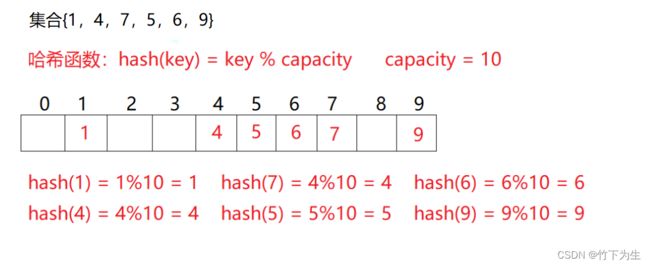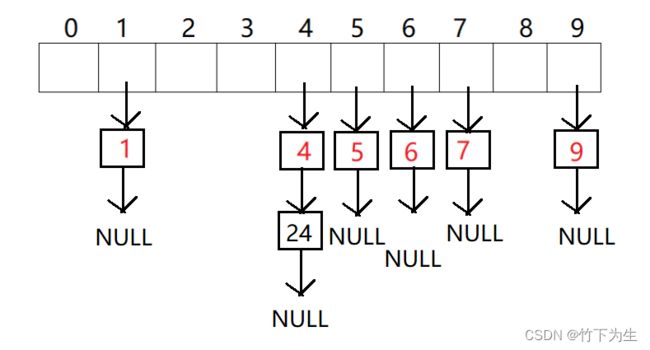C++进阶篇5-哈希
一、unordered系列关联式容器
在C++98中,STL提供了底层为红黑树结构的一系列关联式容器,在查询时效率可达到log_2N,即最差情况下需要比较红黑树的高度次,当树中的节点非常多时,查询效率也不理想。最优的查询是,进行很少的比较次数就能够将元素找到,因此在C++11中,STL又提供了4个unordered系列的关联式容器( unordered_set / unordered_multiset / unordered_map / unordered_multimap ),这四个容器与红黑树结构的关联式容器使用方式基本类似,只是其底层结构不同
这里就简单介绍一下unordered_map的常用函数,其他的用法类似,就不多介绍了
| bool empty() const | 检测unordered_map是否为空 |
| size_t size() const | 获取unordered_map的有效元素个数 |
| begin() |
返回unordered_map第一个元素的迭代器
|
| end() | 返回unordered_map最后一个元素的迭代器 |
| operator[] |
返回与key对应的value,没有一个默认值, 该函数只有unordered_map有
|
| iterator find(const K&key) | 返回key在哈希桶中的位置 |
|
size_t count(const K& key)
|
返回哈希桶中关键码为key的键值对的个数
|
| insert | 增 |
| erase | 删 |
| void clear() | 清空有效元素 |
二、底层结构
1、哈希的概念
无论是顺序结构还是平衡树,只要数据量变大,就不可避免的会增加查找的时间,即增加了比较关键字的次数,那么我们能不能通过一次对比就直接找到元素呢?即通过所给的关键字直接找到想要的元素
最理想的方式:直接在key-value之间建立某种函数映射关系,使得每个key只对应一个value,那么我们就能根据所给的key一步找到value
当向该结构中
- 插入元素:根据待插入元素的关键码,以此函数计算出该元素的存储位置并按此位置进行存放
- 搜索元素 :对元素的关键码进行同样的计算,把求得的函数值当做元素的存储位置,在结构中按此位置取元素比较,若关键码相等,则搜索成功
该方式即为哈希(散列)方法,哈希方法中使用的转换函数称为哈希(散列)函数,构造出来的结构称
为哈希表(Hash Table)(或者称散列表)
一般用取模运算将数组下标和关键字建立联系,如下
但是这个哈希表结构是存在一定问题的,比如当我们再往里面插入一个24,就会发现下标为4的位置已经有值了,这个现象叫做哈希冲突或哈希碰撞,即不同关键字通过相同哈希函数计算出相同的哈希地址
2、哈希函数
引起哈希冲突的一个原因可能是:哈希函数设计不够合理。哈希函数设计原则:
- 哈希函数的定义域必须包括需要存储的全部关键码,而如果散列表允许有m个地址时,其值域必须在0到m-1之间
- 哈希函数计算出来的地址能均匀分布在整个空间中
- 哈希函数应该比较简单
常见哈希函数
1. 直接定址法--(常用)
- 取关键字的某个线性函数为散列地址:Hash(Key)= A*Key + B
- 优点:简单、均匀
- 缺点:需要事先知道关键字的分布情况
- 使用场景:适合查找比较小且连续的情况
2. 除留余数法--(常用)
- 设散列表中允许的地址数为m,取一个不大于m,但最接近或者等于m的质数p作为除数,按照哈希函数:Hash(key) = key% p(p<=m),将关键码转换成哈希地址
3. 平方取中法--(了解)
- 假设关键字为1234,对它平方就是1522756,抽取中间的3位227作为哈希地址;
- 再比如关键字为4321,对它平方就是18671041,抽取中间3位671(或710)作为哈希地址
- 平方取中法比较适合:不知道关键字的分布,而位数又不是很大的情况
4. 折叠法--(了解)
- 折叠法是将关键字从左到右分割成位数相等的几部分(最后一部分位数可以短些),然后将这几部分叠加求和,并按散列表表长,取后几位作为散列地址。
- 折叠法适合事先不需要知道关键字的分布,适合关键字位数比较多的情况
5. 随机数法--(了解)
- 选择一个随机函数,取关键字的随机函数值为它的哈希地址,即H(key) = random(key),其中random为随机数函数。
- 通常应用于关键字长度不等时采用此法
6. 数学分析法--(了解)注意:哈希函数设计的越精妙,产生哈希冲突的可能性就越低,但是无法避免哈希冲突
3、哈希冲突的解决:闭散列和开散列
闭散列
也叫开放定址法,当发生哈希冲突时,如果哈希表未被装满,说明在哈希表中必然还有
空位置,那么可以把key存放到冲突位置中的"下一个"空位置中去
1.线性探测:从发生冲突的位置开始,依次向后探测,直到寻找到下一个空位置为止
插入:
就拿上面的图来说,如果再向里面加24,由于该位置已经被占用,就只能一个一个往后走,看有没有空位置,最后放在下标为8的位置
采用闭散列处理哈希冲突时,不能随便物理删除哈希表中已有的元素,若直接删除元素会影响其他元素的搜索。比如删除元素4,如果直接删除掉,24查找起来可能会受影响。因此线性探测采用标记的伪删除法来删除一个元素。即需要三个状态来描述一个位置
线性探测的实现---里面有很多的细节值得深究,感兴趣的可以自己去实现看看
//该仿函数作用将各种其他类型的值转化成整形
template
struct HashFun
{
size_t operator()(const K& key)
{
return (size_t)key;
}
};
template<>
struct HashFun
{
size_t operator()(const string& key)
{
size_t hash = 0;
for (auto& e : key)
{
hash *= 31;
hash += e;
}
return hash;
}
};
namespace zxws
{
enum Status {
EMPTY,
DELETED,
EXIST
};
template
struct HashData {
pair_kv;
Status _st = EMPTY;
HashData() = default;
HashData(const pair& kv)
:_st(EXIST)
, _kv(kv)
{}
};
template >
class HashTable {
public:
HashTable() :_table(10) {}
bool Insert(const pair& kv)
{
if (Find(kv.first))
return false;
if (_n * 10 / _table.size() == 7)//设置的负荷因子为0.7(具体是什么,下面会讲),if条件这样写是为了方便计算
{
size_t newSize = _table.size() * 2;
HashTablenewHT;
newHT._table.resize(newSize);
for (int i = 0; i < _table.size(); i++)
{
if (_table[i]._st == EXIST)
{
newHT.Insert(_table[i]._kv);//这里直接复用Insert函数,不是递归,本质是两个对象调用该函数
}
}
_table.swap(newHT._table);
}
Hash hf;
size_t hashi = hf(kv.first) % _table.size();
while (_table[hashi]._st == EXIST)
{
hashi++;
hashi %= _table.size();
}
_table[hashi]._kv = kv;
_table[hashi]._st = EXIST;
_n++;
return true;
}
HashData* Find(const K& key)
{
Hash hf;
size_t hashi = hf(key) % _table.size();
while (_table[hashi]._st != EMPTY)
{
if (_table[hashi]._st == EXIST
&& _table[hashi]._kv.first == key)
{
return &_table[hashi];
}
hashi++;
hashi %= _table.size();
}
return nullptr;
}
bool Erase(const K& key)
{
HashData* ret = Find(key);
if (ret->_st == EXIST)
{
ret->_st = DELETED;
_n--;
return true;
}
return false;
}
void Print()//测试用的函数
{
for (size_t i = 0; i < _table.size(); i++)
{
if (_table[i]._st == EXIST)
cout << i << "->" << _table[i]._kv.first << endl;
else if (_table[i]._st == DELETED)
cout << i << "->" << "D" << endl;
else
cout << i << "->" << endl;
}
}
private:
vector>_table;
size_t _n = 0;
};
} 2.二次探测:即以1^2,2^2,3^2……往后找空位,防止出现堆积再一起的情况
开散列
开散列法又叫链地址法(开链法),首先对关键字集合用散列函数计算散列地址,具有相同地
址的关键字归于同一子集合,每一个子集合称为一个桶,各个桶中的元素通过一个单链表链
接起来,各链表的头结点存储在哈希表中。 如下图
从上图可以看出,开散列中每个桶中放的都是发生哈希冲突的元素
开散列的实现
namespace zxws
{
template
struct HashNode
{
HashNode* next;
pair_kv;
HashNode(const pair&kv)
:next(nullptr)
,_kv(kv)
{}
};
template>//HashFun这个函数在闭散列的实现代码的最开始
class HashTable
{
typedef HashNode Node;
public:
HashTable()
{
_table.resize(10);
}
~HashTable()
{
for (size_t i = 0; i < _table.size(); i++)
{
Node* cur = _table[i];
while (cur)
{
Node* next = cur->next;
delete cur;
cur = next;
}
}
}
bool Insert(const pair& kv)
{
if (Find(kv.first))
return false;
Hash hf;
if (_n == _table.size())//增容的条件在下面会讲
{
//复用之前的结点
size_t sz = _table.size()*2;
vectornewTable;
newTable.resize(sz);
for (size_t i = 0; i < _table.size(); i++)
{
Node* cur = _table[i];
while (cur)
{
Node* next = cur->next;
size_t hashi = hf(cur->_kv.first) % sz;//需要重新计算哈希地址
cur->next = newTable[hashi];
newTable[hashi] = cur;
cur = next;
}
_table[i] = nullptr;
}
_table.swap(newTable);
}
size_t hashi = hf(kv.first) % _table.size();
Node* newnode = new Node(kv);
newnode->next = _table[hashi];
_table[hashi] = newnode;
++_n;
}
Node* Find(const K& key)
{
Hash hf;
size_t hashi = hf(key) % _table.size();
Node* cur = _table[hashi];
while (cur)
{
if (cur->_kv.first == key)
return cur;
cur = cur->next;
}
return nullptr;
}
bool Erase(const K& key)
{
Hash hf;
size_t hashi = hf(key) % _table.size();
Node* cur = _table[hashi];
Node* prev = nullptr;
while (cur)
{
if (cur->_kv.first == key)
{
if (prev == nullptr)
_table[hashi] = cur->next;
else
prev->next = cur->next;
delete cur;
--_n;
return true;
}
cur = cur->next;
}
return false;
}
private:
vector_table;
size_t _n;//有效元素个数
};
} 开散列增容
桶的个数是一定的,随着元素的不断插入,每个桶中元素的个数不断增多,极端情况下,可
能会导致一个桶中链表节点非常多,会影响的哈希表的性能,因此在一定条件下需要对哈希
表进行增容,那该条件怎么确认呢?开散列最好的情况是:每个哈希桶中刚好挂一个节点,
再继续插入元素时,每一次都会发生哈希冲突,因此,在元素个数刚好等于桶的个数时,可
以给哈希表增容。
HashFun函数的作用
因为我们写的哈希表的哈希函数为取模运算,只能是整形才能进行计算,所以如果是替他类型,我们就需要先将它转换成一个整形值,HashFun的作用就是将不同类型的值转成整形,我只写了string和一般的整形类型,如果是其他的自定义类型需要自己写仿函数,传入类模板
开散列和闭散列相比
- 优点1:不会出现不同的关键字哈希之后的地址相互影响的情况,就比如找24,闭散列要找5次,开散列只要2次,即查找速率加快
- 优点2:链地址法处理溢出,需要增设链接指针,似乎增加了存储开销。事实上:由于开地址法必须保持大量的空闲空间以确保搜索效率,如二次探查法要求装载因子a <=0.7,而表项所占空间又比指针大的多,所以使用链地址法反而比开地址法节省存储空间。
三、unordered_set和unordered_map的模拟实现(与STL中的实现有所差异)
1.底层结构HashTable
template
struct HashFun
{
size_t operator()(const K& key)
{
return (size_t)key;
}
};
template<>
struct HashFun
{
size_t operator()(const string& key)
{
size_t hash = 0;
for (auto& e : key)
{
hash *= 31;
hash += e;
}
return hash;
}
};
namespace zxws
{
//函数模板的前置声明
template
class HashBucket;
template
struct HashNode
{
HashNode* next;
T _data;
HashNode(const T& data)
:next(nullptr)
, _data(data)
{}
};
template
struct Iterator
{
typedef Iterator Self;
HashNode* _cur;
size_t _hashi;
const HashBucket* _phb;//
Iterator(HashNode*cur, size_t hashi, const HashBucket* phb)//
:_cur(cur)
,_hashi(hashi)
,_phb(phb)
{}
Iterator(const Self& t)
:_cur(t._cur)
, _hashi(t._hashi)
, _phb(t._phb)
{}
Self& operator++()
{
if (_cur->next)
{
_cur = _cur->next;
return *this;
}
else
{
_hashi++;
while (_hashi<_phb->_ht.size())//
{
if (_phb->_ht[_hashi])
{
_cur = _phb->_ht[_hashi];
return *this;
}
_hashi++;
}
_cur = nullptr;//
//_hashi = -1;
return *this;
}
}
bool operator==(const Self& t) const
{
return _cur == t._cur;
}
bool operator!=(const Self& t) const
{
return _cur != t._cur;
}
Self operator++(int)
{
Iterator it(*this);
this->operator++();
return it;
}
Ref operator*()
{
return _cur->_data;
}
Ptr operator->()
{
return &_cur->_data;
}
};
template
class HashBucket {
//类模板的友元声明
template
friend struct Iterator;
public:
typedef HashNode Node;
typedef Iterator iterator;
typedef Iterator const_iterator;
HashBucket():_ht(10) {}
iterator begin()
{
for (size_t i = 0; i < _ht.size(); i++)
{
if (_ht[i])
return iterator(_ht[i], i, this);
}
return end();
}
iterator end()
{
return iterator(nullptr, -1, this);
}
const_iterator begin() const
{
for (size_t i = 0; i < _ht.size(); i++)
{
if (_ht[i])
return const_iterator(_ht[i], i, this);
}
return end();
}
const_iterator end() const
{
return const_iterator(nullptr, -1, this);
}
void swap(const HashBucket& tmp)
{
std::swap(_ht, tmp._ht);
std::swap(_n, tmp._n);
}
pair insert(const T& data)
{
Hash hf;
KeyOfData kod;
auto ret = find(kod(data));
if (ret!=end())
return make_pair(ret,false);
if (_n == _ht.size())
{
vectorv(2 * _ht.size());
for (size_t i = 0; i < _ht.size(); i++)
{
Node* cur = _ht[i];
while (cur)
{
Node* next = cur->next;
size_t hashi = hf(kod(cur->_data)) % v.size();
cur->next = v[hashi];
v[hashi] = cur;
cur = next;
}
_ht[i] = nullptr;
}
_ht.swap(v);
}
size_t hashi = hf(kod(data)) % _ht.size();
Node* newnode = new Node(data);
newnode->next = _ht[hashi];
_ht[hashi] = newnode;
_n++;
return make_pair(iterator(newnode, hashi, this), false);
}
iterator find(const K& key)
{
Hash hf;
KeyOfData kod;
size_t hashi = hf(key) % _ht.size();
Node* cur = _ht[hashi];
while (cur)
{
if (kod(cur->_data) == key)
return iterator(cur, hashi, this);
cur = cur->next;
}
return end();
}
bool erase(const K& key)
{
Hash hf;
KeyOfData kod;
size_t hashi = hf(key) % _ht.size();
Node* cur = _ht[hashi];
Node* pre = nullptr;
while (cur)
{
if (kod(cur->_data) == key)
{
if (pre == nullptr)
{
_ht[hashi] = cur->next;
}
else
{
pre->next = cur->next;
}
delete cur;
_n--;
return true;
}
pre = cur;
cur = cur->next;
}
return false;
}
iterator erase(iterator pos)
{
if (pos == end())
return pos;
KeyOfData kod;
Node* cur = pos._cur;
++pos;
erase(kod(cur->_data));
return pos;
}
const_iterator erase(const_iterator pos)
{
if (pos._cur == nullptr)
return pos;
KeyOfData kod;
Node* cur = pos._cur;
++pos;
erase(kod(cur->_data));
return pos;
}
size_t size()
{
return _n;
}
bool empty()
{
return _n == 0;
}
size_t bucket_count()
{
size_t cnt = 0;
for (size_t i = 0; i < _ht.size(); i++)
{
if (_ht[i])
cnt++;
}
return cnt;
}
size_t bucket_size(const K& key)
{
Hash hf;
size_t cnt = 0;
size_t hashi = hf(key);
for (Node* cur = _ht[hashi]; cur; cur = cur->next)
cnt++;
return cnt;
}
private:
vector _ht;
size_t _n = 0;
};
} 2.unordered_set的封装
namespace zxws
{
template >
class unordered_set {
struct KeyOfData
{
const K& operator()(const K& key)
{
return key;
}
};
public:
typedef typename HashBucket::const_iterator iterator;
typedef typename HashBucket::const_iterator const_iterator;
pair insert(const K& data)
{
auto ret=_hb.insert(data);
return make_pair(iterator(ret.first._cur, ret.first._hashi, ret.first._phb), ret.second);
}
iterator begin() const
{
return _hb.begin();
}
iterator end() const
{
return _hb.end();
}
iterator find(const K& key)
{
auto ret = _hb.find(key);
return iterator(ret._cur, ret._hashi, ret._phb);
}
bool erase(const K& key)
{
return _hb.erase(key);
}
iterator erase(iterator pos)
{
return _hb.erase(pos);
}
size_t bucket_count()
{
return _hb.BucketCount();
}
size_t bucket_size(const K& key)
{
return _hb.BucketSize(key);
}
size_t size()const
{
return _hb.size();
}
bool empty()const
{
return _hb.empty();
}
private:
HashBucket_hb;
};
} 3.unordered_map的封装
namespace zxws
{
template >
class unordered_map {
struct KeyOfData {
const K& operator()(const pair& kv)
{
return kv.first;
}
};
public:
typedef typename HashBucket, Hash, KeyOfData>::iterator iterator;
typedef typename HashBucket, Hash, KeyOfData>::const_iterator const_iterator;
pair insert(const pair& data)
{
return _hb.insert(data);
}
V& operator[](const K& key)
{
auto ret = _hb.insert(make_pair(key, V()));
return ret.first->second;
}
iterator begin()
{
return _hb.begin();
}
iterator end()
{
return _hb.end();
}
const_iterator begin() const
{
return _hb.begin();
}
const_iterator end() const
{
return _hb.end();
}
iterator find(const K& key)
{
return _hb.find(key);
}
bool erase(const K& key)
{
return _hb.erase(key);
}
iterator erase(iterator pos)
{
return _hb.erase(pos);
}
size_t bucket_count()
{
return _hb.BucketCount();
}
size_t bucket_size(const K& key)
{
return _hb.BucketSize(key);
}
size_t size()const
{
return _hb.size();
}
bool empty()const
{
return _hb.empty();
}
private:
HashBucket,Hash, KeyOfData>_hb;
};
} 


